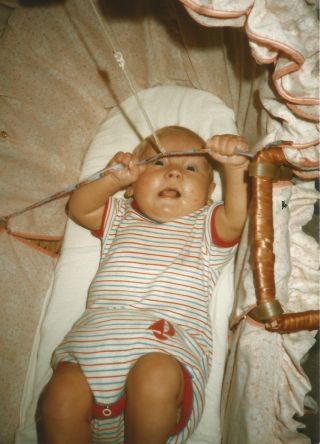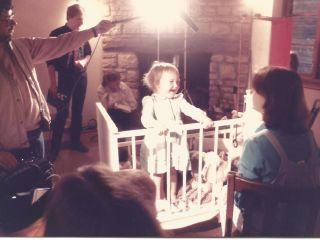Sleep
Does Your Baby Like Music?
Let your baby take charge and choose the music they like best.
Posted April 16, 2015
Do you know what music your baby likes best? Can you even find out?
By a strange fate, I ended up inventing a way to get babies to tell us, and the results were something of a surprise. To my delight this simple invention has finally found its way to a commercial product and now any parent can let their own baby choose.
The story began back in the early 1980s when my daughter Emily was born. We lived in rural England and in those days there was a little maternity hospital in the next village where the methods were—shall I say—rather old-fashioned. We mothers stayed in hospital for 5 or 6 days after the birth and during that time our babies were all taken away from us at night and kept together in a nursery. When they needed feeding, a nurse would come and get us but otherwise we did not see them until morning.
This had the great advantage that we could sleep more or less through the night but the disadvantage was that we (and I guess I was not alone) worried about how happy our babies were in that nursery without their mums. To keep the babies quiet the nurses played a tape of a loud noise that sounded like a vacuum cleaner or just white noise. To me it sounded horrible and I worried about my tiny baby Emily. Did she like the noise? It certainly seemed to keep the babies quieter and even sent them to sleep, but I could imagine my poor little baby hating the noise. She might find it as unpleasant as I did but still find herself going to sleep, despite hating it. But how could I tell?
There was nothing I could do while in the hospital. The rules were the rules! But once I got home my husband, Tom, and I got to work. I reasoned that if a baby liked a sound she would work to keep it going. Young babies cannot understand the concepts of “on” and “off” so we could not give her the sort of switches that adults use. So we rigged up a string that hung across her cot, just above her head and easily within reach. We connected the string to a cassette player (yes—that’s how we listened to music in those days!) and arranged it so that if she pulled on the string the switch closed and the tape played. As soon as she let go it stopped. This meant that if she wanted a sound to continue she had to keep pulling all the time. If she’d had enough she just let go. When she was nearly four months old we decided she was ready to try. We put the horrible noise tape in the machine and handed over to Emily.

It worked! Indeed it worked far, far better than we had ever expected. Within a day Emily had learnt to pull on the string. She pulled and pulled. Clearly she liked the nasty noise and was willing to make an effort to keep it playing.
She was a bit too clever for us though. Very soon she learned how to put her arm right over the top of the string, put her fingers firmly into her mouth and go to sleep with the weight of her arm holding the string down without her making any more effort at all. One day when she was a little older we went into her bedroom to find that she had placed her teddy bear across the string. So he could do the work and she didn’t have to!
Being psychologists, we wanted to find out more than whether Emily just liked that original noise. So we soon gave her different tapes in the machine – kids’ music, stories, classical music and even pop. But how could we find out which she liked best? One method was to measure how long she played each one but this wouldn’t be accurate if she got her bear to do the work. So we changed over to a ring or handle hanging on a vertical string. The teddy couldn’t pull this one. Then we added a second string and handle. At last we could compare two different tapes at once.
But how would we know which string she pulled most? We certainly didn’t want to stay watching or listening for hours on end. Happily, we didn’t have to. This was the age of the first ever home computers and we had a brand new, just invented, BBC Micro. We dug a hole through Emily’s bedroom wall, installed the computer in the next room and with great ingenuity (it would be easy now!), Tom wrote a program so that the BBC Micro would record every time she pulled the handles. We called the machine BabyTape.
At last we had some real data. The so-called ‘Mozart Effect’ had not been popularised then but we thought that classical music might be good for Emily. She didn’t like it. She didn’t much like Status Quo either—our own choice of music at the time. What she liked best of all was a collection of children’s songs and a story about a bear. These two won out every time.
And we noticed something else. As Emily got older we began to leave the machine on her cot during the night and it seemed to us that on those nights she woke us up less often. This really had to be tested. So we compared nights with and without the tape. Sure enough the computer confirmed that when she had the BabyTape she woke up several times during the night and pulled the strings—without waking us. Presumably this was enjoyment enough and she went back to sleep without crying for us to come and comfort her.
This had to be tested further. So we made more BabyTapes, enlisted the help of several friends, and collected data from them and their babies. Their babies also enjoyed the machine and played with it a lot. Indeed, they also slept better, as did our son, born two years later. We collated the results of these experiments and I presented them at a national psychology conference.

At first we tried to turn BabyTape into a commercial product but life overtook us and we didn’t manage it. Decades later, Tom had another attempt but in the midst of this, completely unexpectedly, he died at the age of 58. We were all distraught and once again BabyTape was left on the shelf. But now, at last, it is back. Called QuietNight, the ‘ultimate crib mobile’ works in exactly the same way as our crude machines did but uses the latest technology to provide much more flexibility. It allows you to give your baby any sounds you like and to record everything they do. So you can find out exactly what your baby’s musical preferences are.
This has attracted lots attention from new parents, including a recent Daily Mail article. In response, a few have worried that it might be cruel to leave their baby to comfort itself during the night in case there’s really something wrong, but if there’s something wrong a baby will cry and then you must go and see what’s up. Indeed I imagine babies are not so very different from us. We can wake in the night for no very good reason and all we want is to go back to sleep. Pull the string, hear some nice music, and go off into the land of nod again. If your baby needs you they will surely cry. My own feeling, having had our own BabyTape, was that both we and our babies were more rested in the mornings and that was good for us all. An exhausted parent is not a good parent. So this worry does not make sense to me.
A more relevant concern is baby’s age. It’s important not to give Quiet Night to a baby that is too young. If they don’t have the coordination to grasp a handle easily then they will get frustrated and upset and this will do more harm than good. Indeed, they may never learn to enjoy playing the music. All babies differ in how quickly they gain this kind of control. So my advice would be to try it from about four months and if your baby is unable to grasp the handle easily then take it away and try again in a couple of weeks. It must be something they enjoy, not a developmental test.
The joy of all this to me is that the baby takes charge. I often looked at my little ones and wondered whether they’d like more control. It seems they did. Perhaps now that there’s QuietNight, with its built in data collection and learning capacity, we’ll be able to do a lot more research on babies and their music. Above all, I’m glad that other parents can now, with much less trouble than we had, let their own babies listen to what they like best.




